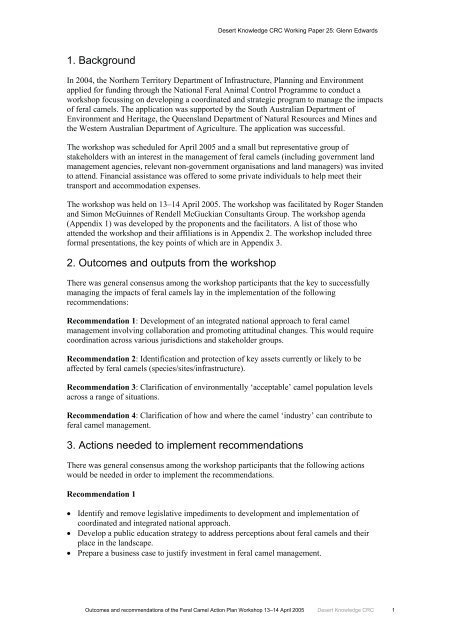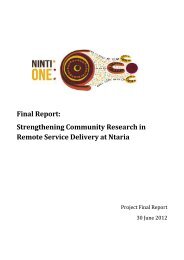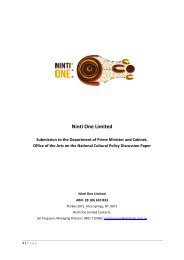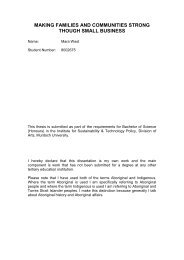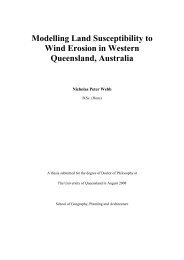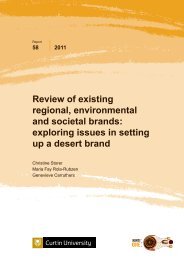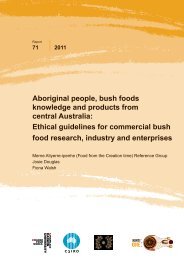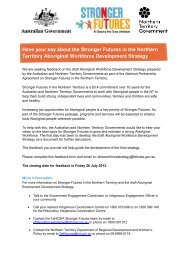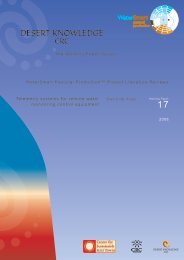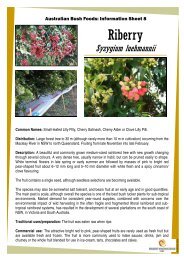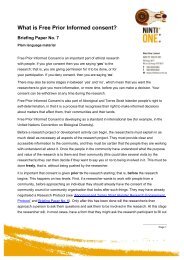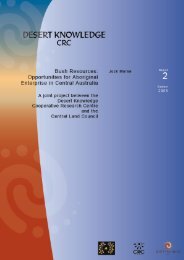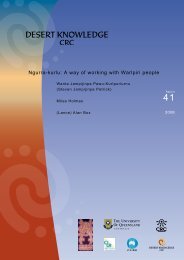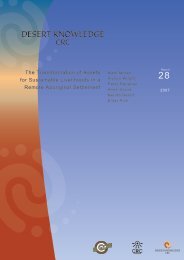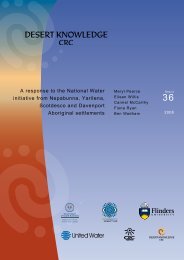Outcomes and recommendations of the Feral Camel ... - Ninti One
Outcomes and recommendations of the Feral Camel ... - Ninti One
Outcomes and recommendations of the Feral Camel ... - Ninti One
- No tags were found...
Create successful ePaper yourself
Turn your PDF publications into a flip-book with our unique Google optimized e-Paper software.
Desert Knowledge CRC Working Paper 25: Glenn Edwards1. BackgroundIn 2004, <strong>the</strong> Nor<strong>the</strong>rn Territory Department <strong>of</strong> Infrastructure, Planning <strong>and</strong> Environmentapplied for funding through <strong>the</strong> National <strong>Feral</strong> Animal Control Programme to conduct aworkshop focussing on developing a coordinated <strong>and</strong> strategic program to manage <strong>the</strong> impacts<strong>of</strong> feral camels. The application was supported by <strong>the</strong> South Australian Department <strong>of</strong>Environment <strong>and</strong> Heritage, <strong>the</strong> Queensl<strong>and</strong> Department <strong>of</strong> Natural Resources <strong>and</strong> Mines <strong>and</strong><strong>the</strong> Western Australian Department <strong>of</strong> Agriculture. The application was successful.The workshop was scheduled for April 2005 <strong>and</strong> a small but representative group <strong>of</strong>stakeholders with an interest in <strong>the</strong> management <strong>of</strong> feral camels (including government l<strong>and</strong>management agencies, relevant non-government organisations <strong>and</strong> l<strong>and</strong> managers) was invitedto attend. Financial assistance was <strong>of</strong>fered to some private individuals to help meet <strong>the</strong>irtransport <strong>and</strong> accommodation expenses.The workshop was held on 13–14 April 2005. The workshop was facilitated by Roger St<strong>and</strong>en<strong>and</strong> Simon McGuinnes <strong>of</strong> Rendell McGuckian Consultants Group. The workshop agenda(Appendix 1) was developed by <strong>the</strong> proponents <strong>and</strong> <strong>the</strong> facilitators. A list <strong>of</strong> those whoattended <strong>the</strong> workshop <strong>and</strong> <strong>the</strong>ir affiliations is in Appendix 2. The workshop included threeformal presentations, <strong>the</strong> key points <strong>of</strong> which are in Appendix 3.2. <strong>Outcomes</strong> <strong>and</strong> outputs from <strong>the</strong> workshopThere was general consensus among <strong>the</strong> workshop participants that <strong>the</strong> key to successfullymanaging <strong>the</strong> impacts <strong>of</strong> feral camels lay in <strong>the</strong> implementation <strong>of</strong> <strong>the</strong> following<strong>recommendations</strong>:Recommendation 1: Development <strong>of</strong> an integrated national approach to feral camelmanagement involving collaboration <strong>and</strong> promoting attitudinal changes. This would requirecoordination across various jurisdictions <strong>and</strong> stakeholder groups.Recommendation 2: Identification <strong>and</strong> protection <strong>of</strong> key assets currently or likely to beaffected by feral camels (species/sites/infrastructure).Recommendation 3: Clarification <strong>of</strong> environmentally ‘acceptable’ camel population levelsacross a range <strong>of</strong> situations.Recommendation 4: Clarification <strong>of</strong> how <strong>and</strong> where <strong>the</strong> camel ‘industry’ can contribute t<strong>of</strong>eral camel management.3. Actions needed to implement <strong>recommendations</strong>There was general consensus among <strong>the</strong> workshop participants that <strong>the</strong> following actionswould be needed in order to implement <strong>the</strong> <strong>recommendations</strong>.Recommendation 1• Identify <strong>and</strong> remove legislative impediments to development <strong>and</strong> implementation <strong>of</strong>coordinated <strong>and</strong> integrated national approach.• Develop a public education strategy to address perceptions about feral camels <strong>and</strong> <strong>the</strong>irplace in <strong>the</strong> l<strong>and</strong>scape.• Prepare a business case to justify investment in feral camel management.<strong>Outcomes</strong> <strong>and</strong> <strong>recommendations</strong> <strong>of</strong> <strong>the</strong> <strong>Feral</strong> <strong>Camel</strong> Action Plan Workshop 13–14 April 2005 Desert Knowledge CRC 1


